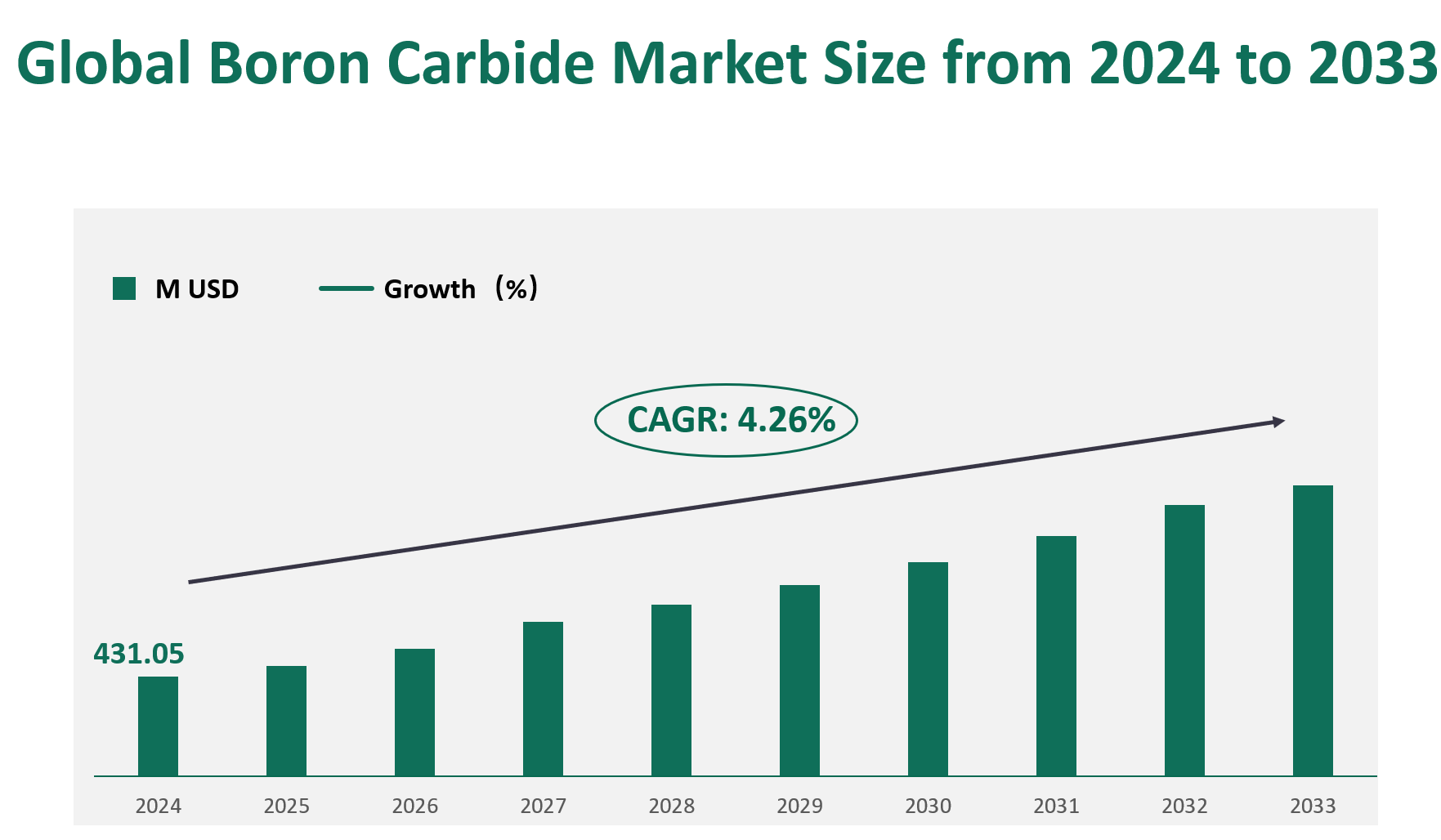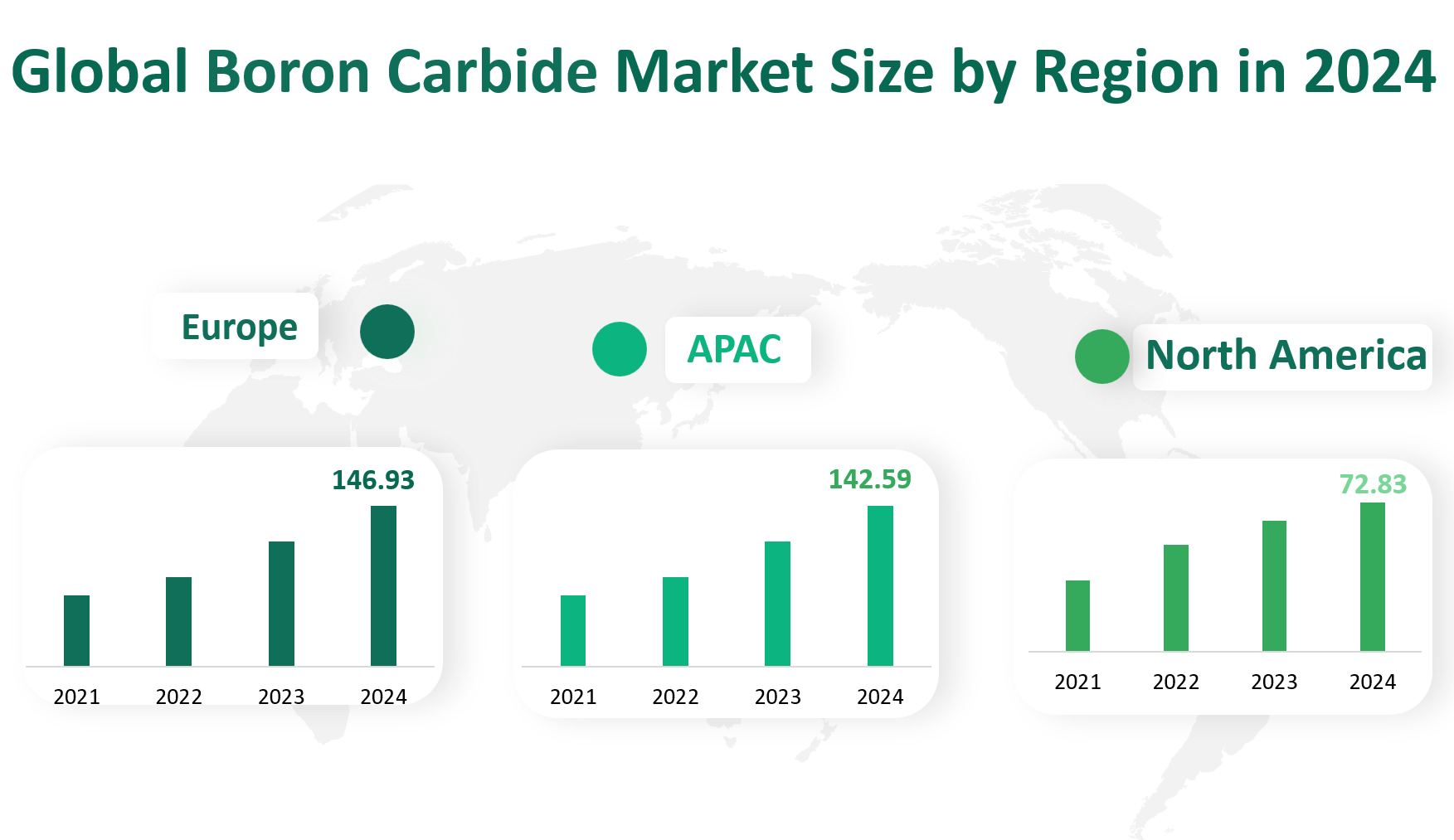1. Global Boron Carbide Market Insight Analysis
The global Boron Carbide market is projected to reach a value of $431.05 million by 2024, with a Compound Annual Growth Rate (CAGR) of 4.26% from 2024 to 2033.
Boron Carbide, a hard-black crystal with a metallic luster, is commonly known as black diamond. It is produced from boric acid and carbon materials at high temperatures in an electric furnace. This material is renowned for its exceptional properties, including high hardness, resistance to high temperatures, chemical stability, and low specific gravity. These characteristics make it highly valuable in various industrial applications, such as nuclear reactors, abrasives, ballistic protection, and refractory materials.
Figure Global Boron Carbide Market Size (M USD) and CAGR (2024-2033)

2. Driving and Limiting Factors of Boron Carbide Market Growth
High Demand for High-Quality Materials: Boron Carbide’s unique properties, such as its high hardness and resistance to wear and corrosion, make it an ideal material for industries requiring durable and reliable components. This demand is particularly strong in the aerospace, defense, and nuclear sectors.
Technological Advancements: Continuous improvements in production processes and product quality have expanded the range of applications for Boron Carbide. Innovations in manufacturing techniques have led to higher purity and better performance, further enhancing its market appeal.
Economic Growth in Emerging Markets: Rapid economic development in regions like Asia-Pacific has spurred the growth of industries that rely on Boron Carbide, such as metal manufacturing and nuclear power. The increasing demand from these sectors is a significant driver of market expansion.
High Product Prices: The cost of Boron Carbide is relatively high due to the specialized production processes and raw materials involved. This high cost can limit its adoption in some industries, especially those sensitive to material costs.
Product Defects: The production process of Boron Carbide can result in certain defects, such as carbon inclusions, which can affect its physical and chemical properties. These defects can reduce the material’s efficiency and reliability, thereby limiting its market potential.
Environmental and Regulatory Challenges: The production of Boron Carbide involves high energy consumption and can have environmental impacts. Stringent regulations regarding emissions and energy efficiency can pose challenges for manufacturers.
3. Technology Innovation and Corporate Mergers and Acquisitions in Boron Carbide Market
Technological innovation and corporate activity are key components shaping the future of the Boron Carbide market. Companies are investing heavily in research and development to enhance the properties and applications of Boron Carbide. For example, advancements in production processes have led to higher purity and improved mechanical properties, making the material suitable for more demanding applications.
Corporate mergers and acquisitions are also playing a significant role in the industry. Major players such as 3M, CoorsTek, and Dalian Jinma Boron Technology Group Co., Ltd. are consolidating their market positions through strategic acquisitions and partnerships. These activities are aimed at expanding market reach, enhancing technological capabilities, and improving production efficiencies.
4. Global Boron Carbide Market Size by Type
Boron carbide is a highly versatile material known for its exceptional hardness, chemical stability, and resistance to high temperatures and corrosion. These properties make it a crucial component in various industrial applications. The market for boron carbide is segmented into two primary product types: Nuclear Grade and Abrasive Grade.
Nuclear grade boron carbide is specifically designed for applications in the nuclear industry. It is used as a neutron absorber in nuclear reactors due to its ability to capture neutrons without forming radioactive isotopes. This property is critical for controlling the rate of nuclear reactions, ensuring the safe and efficient operation of nuclear power plants. Nuclear grade boron carbide is manufactured to meet stringent industry standards, such as ASTM C750 and ASTM C751, and often involves the use of enriched boric acid as a precursor material to achieve the desired purity and stoichiometry. In 2024, the market value of nuclear grade boron carbide is projected to be approximately 85.62 million USD.
Abrasive grade boron carbide is the most widely used type, accounting for the majority of the market share. It is renowned for its extreme hardness, which is second only to diamond. This property makes it an ideal material for various abrasive applications, including grinding, lapping, and polishing. Abrasive grade boron carbide is available in different particle sizes, making it suitable for a wide range of industrial processes. It is used in the manufacturing of cutting tools, grinding wheels, and other abrasive products, providing superior performance and durability compared to traditional materials. In 2024, the market value of abrasive grade boron carbide is forecasted to be around 345.42 million USD.
Table Global Boron Carbide Market Size by Type in 2024
5. Global Boron Carbide Market Size by Application
Boron carbide’s role in the nuclear industry is pivotal due to its neutron-absorbing capabilities. It is used in nuclear reactors to control the rate of nuclear reactions, ensuring safe and efficient operation. The market value of boron carbide in nuclear applications is projected to be around 85.62 million USD in 2024.
Boron carbide nozzles are highly valued for their exceptional wear resistance and durability. These nozzles are used in various industrial processes, including water jet cutting and abrasive blasting, where their hardness and resistance to wear significantly extend their service life. The market value of boron carbide nozzles in 2024 is estimated to be around 54.15 million USD.
The use of boron carbide as an abrasive material is extensive, given its extreme hardness and durability. It is used in grinding, lapping, and polishing applications across various industries, including automotive, aerospace, and electronics. The market value of boron carbide abrasives in 2024 is forecasted to be approximately 96.23 million USD.
Boron carbide’s lightweight and high hardness make it an ideal material for ballistic protection applications. It is used in the manufacturing of body armor, vehicle armor, and other protective equipment. The market value of boron carbide in ballistic protection applications in 2024 is projected to be around 72.48 million USD.
Boron carbide’s resistance to high temperatures and chemical corrosion makes it a valuable material in refractory applications. It is used in the manufacturing of refractory bricks, linings, and other materials that need to withstand extreme conditions. The market value of boron carbide in refractory applications in 2024 is estimated to be around 102.23 million USD.
Table Global Boron Carbide Market Size by Application in 2024
Application | Market Size (M USD) 2024 |
Nuclear | 85.62 |
Boron Carbide Nozzle | 54.15 |
Boron Carbide Abrasives | 96.23 |
Ballistic Protection | 72.48 |
Refractory | 102.23 |
Others | 20.33 |
6. Global Boron Carbide Market by Top Regions
North America remains a dominant market for boron carbide, driven by its advanced technological infrastructure and high demand for high-quality materials in industries such as aerospace, defense, and nuclear energy. The region’s market value in 2024 is forecasted to be approximately 72.83 million USD. The United States, in particular, is a significant contributor to this market, with a strong presence of major manufacturers and research institutions.
Europe is another major market for boron carbide, with a projected market value of around 146.93 million USD in 2024. The region benefits from a mature industrial base and a strong focus on high-tech applications. Countries such as Germany, France, and the United Kingdom are key players in the European market, driving demand for boron carbide in sectors like automotive, aerospace, and nuclear power.
China is emerging as a significant market for boron carbide, with a projected market value of 142.59 million USD in 2024. This region’s growth is driven by rapid industrialization and urbanization.
South America’s market for boron carbide is relatively smaller but growing, with a projected market value of 2.16 million USD in 2024.
The Middle East and Africa region is also experiencing growth in the boron carbide market, with a projected market value of 3.46 million USD in 2024.
Figure Global Boron Carbide Market Size by Region in 2024

7. Global Boron Carbide Market Analysis by Major Players
7.1 3M
Company Introduction and Business Overview: 3M is a global leader in diversified technologies and innovation, with a strong presence in various industries. Founded in 1902, the company is headquartered in St. Paul, Minnesota, USA. 3M operates in multiple sectors, including electronics, telecommunications, industrial, consumer and office, healthcare, safety, and more. The company is known for its commitment to research and development, resulting in a wide range of innovative products.
Products Offered: 3M offers a variety of boron carbide products, including nuclear grade and abrasive grade materials. These products are used in applications such as neutron absorption in nuclear reactors and as high-performance abrasives in industrial processes. 3M’s boron carbide products are known for their high quality and reliability, meeting stringent industry standards.
7.2 CoorsTek
Company Introduction and Business Overview: CoorsTek is a leading manufacturer of advanced ceramics and engineered materials. Founded in 1910 and headquartered in Golden, Colorado, USA, CoorsTek specializes in the production of components from precision-machined metals, technical ceramics, and engineered plastics. The company serves a wide range of industries, including chemical processing, medical, mining, telecommunications, electronics, automotive, and more.
Products Offered: CoorsTek offers a variety of boron carbide products, including reaction bonded boron carbide, hot-pressed boron carbide, and sintered boron carbide. These products are used in applications such as ballistic armor, semiconductor manufacturing, and other high-performance applications. CoorsTek’s products are known for their exceptional hardness, durability, and resistance to wear.
7.3 Dalian Jinma Boron Technology Group Co., Ltd.
Company Introduction and Business Overview: Dalian Jinma Boron Technology Group Co., Ltd. is a leading manufacturer of boron carbide products, headquartered in Dalian, China. Founded in 1958, the company specializes in the production of borax, boric acid, and boron carbide neutron absorption materials. The company has a strong presence in the global market, exporting its products worldwide.
Products Offered: Dalian Jinma offers a variety of boron carbide products, including nuclear grade and abrasive grade materials. These products are used in applications such as neutron absorption in nuclear reactors and as high-performance abrasives in industrial processes. The company’s products are known for their high quality and reliability, meeting stringent industry standards.

